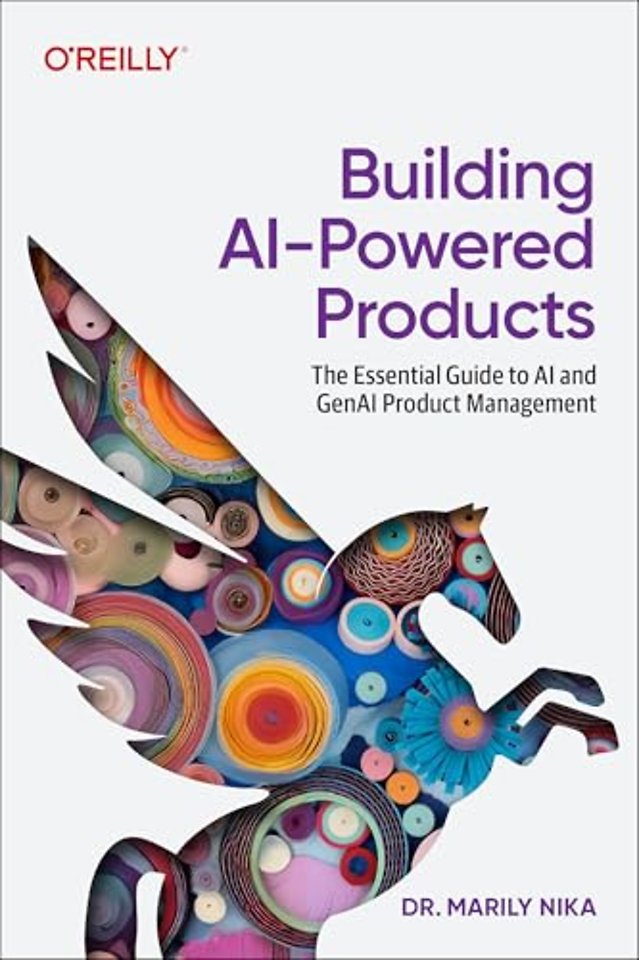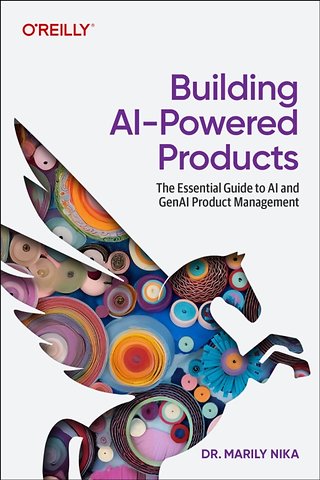Building AI–Powered Products
The Essential Guide to AI and Genai Product Management
Paperback Engels 2025 1e druk 9781098152703Samenvatting
Drawing from her experience at Google and Meta, Dr. Marily Nika delivers the definitive guide for product managers building AI and GenAI powered products. Packed with smart strategies, actionable tools, and real-world examples, this book breaks down the complex world of AI agents and generative AI products into a playbook for driving innovation to help product leaders bridge the gap between niche AI and GenAI technologies and user pain points.
Whether you're already leading product teams or are an aspiring product manager, and regardless of your prior knowledge with AI, this guide will empower you to confidently navigate every stage of the AI product lifecycle.
- Confidently manage AI product development with tools, frameworks, strategic insights, and real-world examples from Google, Meta, OpenAI, and more
- Lead product orgs to solve real problems via agentic AI and GenAI capabilities
- Gain AI Awareness and technical fluency to work with AI models, LLMs, and the algorithms that power them; get cross-functional alignment; make strategic trade-offs; and set OKRs
Specificaties
Lezersrecensies
Inhoudsopgave
Why AI Product Management?
Who Should Read This Book?
What This Book Covers
O’Reilly Online Learning
How to Contact Us
Acknowledgments
Closing Thoughts
1. The Role of AI Product Managers
The Stages of AI Evolution
Traditional AI (1950s–Present)
Generative AI (Late 2010s–Present)
Artificial General Intelligence (2030s?)
Artificial Superintelligence (~2040s?)
How Products Leverage AI
Unique Features of AI
Probabilistic Nature
Dependency on Data
Model Drift
The Need for Model Interpretability and Explainability
Automated Decision Making
Scalability
How These Unique Features Can Impact User Experience
Superpowers of AI and GenAI
Superpower 1: Learning from Massive Data and Content
Superpower 2: Personalization at Scale
Superpower 3: Automating and Optimizing Workflows
Superpower 4: Generating New Content and Experiences
Superpower 5: Prediction and Forecasting
Superpower 6: Real-Time Adaptation
Superpower 7: Unlocking New Types of User Experiences with New Form Factors
The AI PM’s Role
The AI PM’s Skill Set
Organizational Structures
Why Become an AI PM?
What’s Great About Being an AI PM
Subtypes of AI Product Management Roles
Book Road Map
Conclusion
2. The AI Product Development Lifecycle
Types of AI Products
0-to-1 AI Products
1-to-n AI Products
The AI Product Development Lifecycle
Ideation
Opportunity
Concept and Prototype
Testing and Analysis
Rollout
Conclusion
3. Essential AI PM Knowledge
Core Product Management Craft and Practices
Identifying User Segments, User Personas, Pain Points, and User Needs
Writing User Stories
Assessing Trade-offs and Prioritizing in AI Product Management
Building or Buying? Strategic Trade-offs
Defining Your Trade Space
Incorporating Trade-offs in a Product Review
How to Develop General Product Management Skills
Educational Pursuits
Hands-on Experience
Continuous Learning
Essential Leadership and Collaboration Skills
Creativity
Communication
Leadership
Analytical Thinking
Empathy
Engineering Foundations for Product Managers
Working with Code
Key Technical Concepts
The AI Product Development Lifecycle and Operational Awareness
Project Scoping
Data Collection
Model Training
Validation and Testing
Deployment
Remember to Keep Humans in the Loop
Mapping AI Algorithms and Applications
Responsible AI Practices
Conclusion
4. The AI PM’s Day-to-Day
The AI PM Career Ladder
Execution-Level AI Product Management (Levels 4–6)
AI/ML Product Management (Levels 5–7)
Strategic Leadership (Levels 8+)
AI Product Manager Profiles
Ethan Cole
Mark Cramer
Diego Granados
Jaclyn Konzelmann
Arun Rao
Nino Tasca
Yana Welinder
My Two Cents
Cross-functional Collaboration
Conclusion
5. Strategic Thinking in AI
Your Business Strategy: Evaluating AI As a Solution
AI Might Not Always Be the Answer
Disruptive or Sustaining? Navigating the Innovator’s Dilemma
Your AI Strategy: To Build or to Buy?
The Build-Versus-Buy Decision Matrix
Hybrid Approaches: A Balanced Strategy
Your Data Strategy: Populating and Adapting Your Model
Synthetic Versus Real-World Data
Fine-tuning, RAG, or Grounding?
Product Reviews: Getting Buy-in from Leadership
Conclusion
6. Setting Goals and Measuring Success
Product Health Metrics
System Health Metrics
AI Proxy Metrics
Model Quality Metrics
Objective Functions
Confusion Matrices
OKRs for AI Products
Tying Metrics to Goals
A Framework for Crafting AI Product OKRs
Conclusion
7. AI Tools for Product Managers
Tools to Enhance the AIPDL
Tools for Collaboration and Tracking
Conclusion
8. Building AI Agents
What Is an AI Agent?
Not Just Glorified Chatbots
Early Rule-Based Agents
Agentive Products
Comparing Chatbots to AI Agents and Multi-agents
The AI Agent Product Landscape
Crafting the Right AI Agent for Your Product
Task-Specific Vertical Agents Versus General-Purpose Agents
Agent Activation
Autonomy
Feedback and Learning
Design Patterns for Agent Interaction
Side Panel
Floating Bubble
Chat Interface
Integrated UI
Pop-up Notifications
Collaborative Browser Interface
Scalability, Future-proofing, and Other Considerations
Define Success for Your Agent
AI Agent Questionnaire
Conclusion
Appendix
Product Review Template
AI Product Requirements Document Template
Worksheet 1: Assessing AI Opportunity for Your Organization
Section 1: AI Capabilities Assessment
Section 2: Company Mission and AI Alignment
Section 3: Product Pain Points
Section 4: User Impact
Section 5: Benefits and Risks Analysis
Section 6: Resource Assessment
Section 7: Competitive Analysis
Section 8: Implementation Decision
Next Steps
Worksheet 2: AI Implementation Strategy Worksheet
Section 1: Core Project Components
Section 2: User Impact Assessment
Section 3: Benefits and Risks Analysis
Section 4: Resource Assessment
Section 5: Competitive Analysis
Section 6: Implementation Decision
Index
About the Author
Anderen die dit boek kochten, kochten ook
Rubrieken
- advisering
- algemeen management
- coaching en trainen
- communicatie en media
- economie
- financieel management
- inkoop en logistiek
- internet en social media
- it-management / ict
- juridisch
- leiderschap
- marketing
- mens en maatschappij
- non-profit
- ondernemen
- organisatiekunde
- personal finance
- personeelsmanagement
- persoonlijke effectiviteit
- projectmanagement
- psychologie
- reclame en verkoop
- strategisch management
- verandermanagement
- werk en loopbaan







